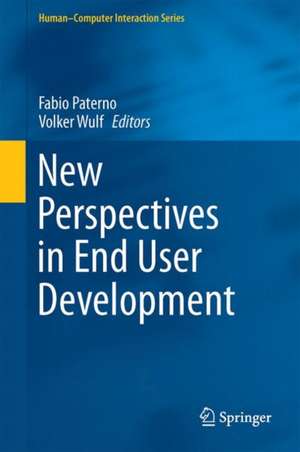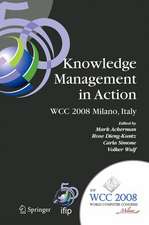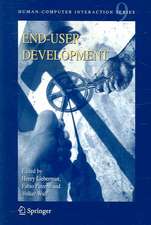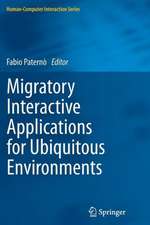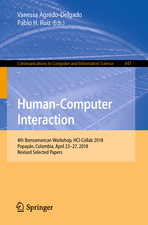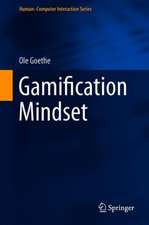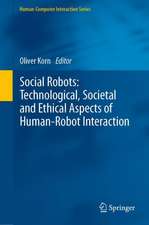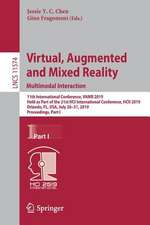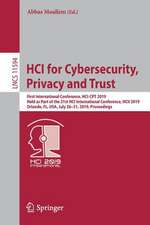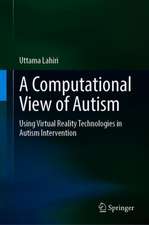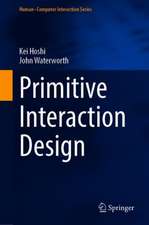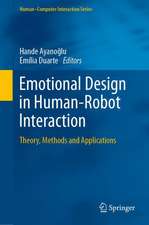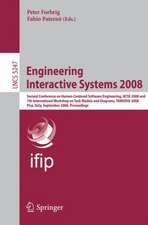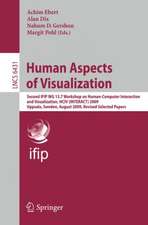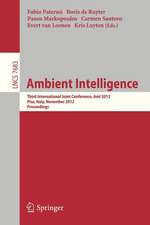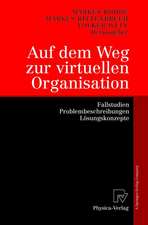New Perspectives in End-User Development
Editat de Fabio Paternò, Volker Wulfen Limba Engleză Hardback – 29 aug 2017
Most people are familiar with the basic functionality and interfaces of computers. However, developing new or modified applications that can effectively support users' goals still requires considerable programming expertise that cannot be expected of everyone. One of the fundamental challenges that lie ahead is the development of environments that enable users with little or no programming experience to develop and modify their own applications. The ultimate goal is to empower people to flexibly employ and personalise advanced inform
ation and communication technologies.
| Toate formatele și edițiile | Preț | Express |
|---|---|---|
| Paperback (1) | 995.89 lei 6-8 săpt. | |
| Springer International Publishing – 12 mai 2018 | 995.89 lei 6-8 săpt. | |
| Hardback (1) | 1002.34 lei 6-8 săpt. | |
| Springer International Publishing – 29 aug 2017 | 1002.34 lei 6-8 săpt. |
Preț: 1002.34 lei
Preț vechi: 1252.92 lei
-20% Nou
Puncte Express: 1504
Preț estimativ în valută:
191.82€ • 199.53$ • 158.36£
191.82€ • 199.53$ • 158.36£
Carte tipărită la comandă
Livrare economică 14-28 aprilie
Preluare comenzi: 021 569.72.76
Specificații
ISBN-13: 9783319602905
ISBN-10: 331960290X
Pagini: 387
Ilustrații: XV, 459 p. 113 illus., 100 illus. in color.
Dimensiuni: 155 x 235 mm
Greutate: 0.84 kg
Ediția:1st ed. 2017
Editura: Springer International Publishing
Colecția Springer
Locul publicării:Cham, Switzerland
ISBN-10: 331960290X
Pagini: 387
Ilustrații: XV, 459 p. 113 illus., 100 illus. in color.
Dimensiuni: 155 x 235 mm
Greutate: 0.84 kg
Ediția:1st ed. 2017
Editura: Springer International Publishing
Colecția Springer
Locul publicării:Cham, Switzerland
Cuprins
Making End User Development More Natural.- End-User Development in Practice: A new paradigm.- A Design Space for End User Development in the Time of the Internet of Things.- Revisiting and Broadening the Meta-Design Framework for End-User Development.- A three-layer meta-design model for addressing domain-specific customization.- End-User Developers - What are they Like?.- Malleability in the hands of end-users.- EUD and infrastructuring – sustaining organizational innovation capabilities.- EUD survival ‘in the wild’: evaluation challenges for field deployments and how to address them.- Toward Theory-Based End-User Software Engineering.- Semiotic Engineering: A cohering theory to connect EUD with HCI, CMC and more.- End-User Development and Social Big Data - Towards Tailorable Situation Assessment with Social Media.- End-User Development and Learning in Second Life: The Evolving Artifacts Framework with Application.- EUD for Serious Games.- Integrating end users in early ideation and prototyping: lessons from an experience in augmenting physical objects.- An End-User Development Framework to Support Quantified Self in Sport Teams.
Textul de pe ultima copertă
This book provides an in-depth insight into the emerging paradigm of End-User Development (EUD), discussing the diversity and potential for creating effective environments for end users. Containing a unique set of contributions from a number of international researchers and institutes, many relevant issues are discussed and solutions proposed, making important aspects of end-user development research available to a broader audience.
Most people are familiar with the basic functionality and interfaces of computers. However, developing new or modified applications that can effectively support users' goals still requires considerable programming expertise, that cannot be expected of everyone. One of the fundamental challenges that lie ahead is the development of environments that enable users with little or no programming experience to develop and modify their own applications. The ultimate goal is to empower people to flexibly employ and personalise advanced information a
nd communication technologies.
Most people are familiar with the basic functionality and interfaces of computers. However, developing new or modified applications that can effectively support users' goals still requires considerable programming expertise, that cannot be expected of everyone. One of the fundamental challenges that lie ahead is the development of environments that enable users with little or no programming experience to develop and modify their own applications. The ultimate goal is to empower people to flexibly employ and personalise advanced information a
nd communication technologies.
Caracteristici
State-of-the-art coverage of the field of end-user development Contains contributions from top international experts in end-user development The first volume to bring together a set of interdisciplinary contributions to create an environment to better understand and utilise end-user development
